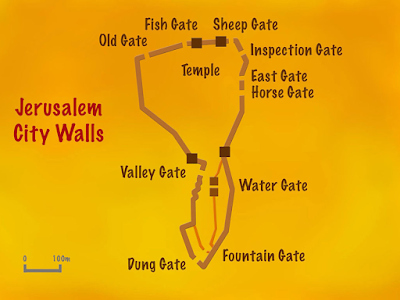Go Deeper: Nehemiah Builds a Wall
Our preschoolers are learning that God is good! In our Bible story "Nehemiah Builds a Wall," we learn that Nehemiah had reason to thank God and the people for their help in rebuilding the wall around Jerusalem. And here, go deeper. Let's dive in!
First, some background. The land of Judah was in a bad way. Over the centuries, the people and their leaders had stopped honoring Yahweh, the Lord God. The kingdom became rundown. And the surrounding kingdoms--most notably, Babylon--started to invade regularly, to take away anything of value. This included taking away many of the people to be slaves. This time is often called the "Babylonian Exile" or "Babylonian Captivity." Later, Babylon fell to the Persian king Cyrus the Great. What was Babylon's was now Persia's. And Cyrus began allowing the Judeans to return to Judah if they wished.
Flash forward about 93 years, to the reign of Persian King Artaxerxes I. By this time, many Judeans had returned to Judah. But they sometimes traveled back to Babylon and Persia to visit with family and friends that were still living there. One such Judean in residence was Nehemiah, who was visited by his brother Hanani and some friends. Nehemiah was born in exile, but Judah was his ancestral home. And so, Nehemiah asked his brother, "How are things back home?" He told Nehemiah the people, "are in great distress and reproach, and the wall of Jerusalem is broken down and its gates are burned with fire" (Nehemiah 1:3).
When Nehemiah heard this, he broke down. He mourned for days. He cried out to God, recalling the words of Jeremiah chapter 4, where God basically says, "If you return to Me, I will return to you." This wasn't just a physical return to the land, but also a return to the teachings of God, and to their covenant with God (Nehemiah 1:4-11).
Nehemiah wanted to do something, but he couldn't. At least not easily, because he was the cup-bearer to King Artaxerxes I.
Time out. What is a cup-bearer? The cup-bearer was a culinary bodyguard. He supervised the supply of all food and drink at the royal table. And his job was to make sure the king was not harmed through food or drink. The cup-bearer often tasted the food and drink before the king did. And if the king did happen to die, it is likely that the cup-bearer would be next, as punishment for his failure to keep the king alive. Scripture suggests that Nehemiah was very good at his job. And because of this, Nehemiah was a trustworthy and high-ranking member of the royal court. But Nehemiah's position also meant he didn't get any vacations, because the king ate and drank every day.
Back to our story. Nehemiah wanted to do something about Jerusalem. But he knew God had to be in charge of the process, because this was a delicate situation. Since Nehemiah was the cup-bearer to the king, that also meant he was the morale officer of the royal court, making sure that the king was always happy and entertained. If the king was sad, mad, or otherwise upset, you did not want to be the cause, because that would likely be the end of you.
So, Nehemiah waited on God. Every day he performed his duties in the royal court. And every night he cried and fasted and prayed. Nehemiah fasted as a way of focusing his attention on God. This went on from the month of Kislev to the month of Nisan, roughly 4 months or 120 days (Nehemiah 1:1; Nehemiah 1:2).
Finally, someone did something. And it wasn't Nehemiah, but rather the king. The king noticed that Nehemiah was sad, not through is behavior in the royal court, but through reports of what Nehemiah did in his off hours, crying and fasting and praying. It could easily have gone badly for Nehemiah at this point. But instead, the king asked, "What's wrong?"
That was Nehemiah's opening. He prayed to God, and then He told the king all about Jerusalem and the destruction.
Then the king asked, "What do you want?" And Nehemiah told him. He wanted to go to Jerusalem, he wanted to rebuild the wall and restore the city.
And then came the moment of truth, the king's response. He said, "How long will you be away?" The king gave Nehemiah what he asked for, including: letters of authority, to present to the governors of the provinces he pass through, and permission to use the king's forest land in rebuilding the gates. In addition, the king gave Nehemiah officers from his army and horsemen (Nehemiah 2:1-8).
When Nehemiah came to Jerusalem, he and his entourage entered as quietly as they could. And he told no one why he was there (Nehemiah 2:9-10).
Three nights later, he quietly left the city and did a personal inspection of the entire wall, the towers and the gates. The next day, Nehemiah told the people all: why he was there, what he had seen, and what he wanted to do. The local officials mocked him. But the people immediately agreed to help (Nehemiah 2:11-20).
Because the surrounding territories opposed the rebuilding of the walls, all the builders were armed and kept their weapons at the ready while they worked, and even when they went to the stream for a drink (Nehemiah 3:1- Nehemiah 4:8).
During the work, Nehemiah learned that some Jews were taking advantage of their countrymen by loaning them money with interest, a practice the Bible calls usury. This required that the people mortgage their land and property, and even enter indentured slavery, just so they could have enough to eat and pay their taxes. Nehemiah put a stop to the practice, telling the people they were doing to each other the very thing that other kingdoms had done to them (Nehemiah 5:1-13).
The king had appointed Nehemiah as governor of the province of Judah. But the local officials tried to turn the people against Nehemiah because his appointment entitled him to much good food and other privileges, leaving that much less for the people. But Nehemiah and his soldiers did not abuse their privileges and made sure the people knew they only consumed what they needed, unlike other officials who were in power (Nehemiah 5:14-19).
As the building continued, officials spread rumors that Nehemiah was going rebel against the king and set himself up as "king of Judah." The officials even bribed some people to participate in a plot they hoped would cause Nehemiah to betray his faith in God and discredit him among the people. But Nehemiah stayed strong and the plot did not succeed (Nehemiah 6:1-14).
At last the wall was completed, and in record time--fifty-two days! The surrounding territories felt threatened by the wall, and they threatened to attack the city. But that story is for another time (Nehemiah 6:15-19).
In addition to rebuilding the wall and the city's infrastructure, Nehemiah instituted extensive reforms in rededicating the Jews to Yahweh, the Lord God. But Nehemiah didn't stay. After twelve years, he left Jerusalem and returned to King Artaxerxes I. Twelve years--that was the answer to the king's question, "How long will you be away."
Nehemiah did none of this in himself, but as a willing instrument of God. And I'm sure Nehemiah was thankful to God and to all the people God gave him to help.
One more bit of trivia. The name Nehemiah means "Yah comforts." Yah is a shortened form of Yahweh, the Lord God of Israel. So, in other words, Nehemiah means "God comforts." And God did comfort his people, through Nehemiah, in the rebuilding the walls and infrastructure of Jerusalem and in bringing the people back to God.
-
Story illustrations are the copyright of Sweet Publishing and licensed by FreeBibleimages (http://freebibleimages.org) for free download under the terms of the Creative Commons Attribution Share-alike 3.0 unported license.
-




Comments
Post a Comment